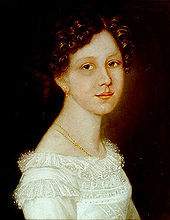|
Marienbad ElegyThe "Marienbad Elegy" is a poem by Johann Wolfgang von Goethe. It is named after the spa town of Marienbad (now Mariánské Lázně) where Goethe, 72-years-old, spent the summer of 1821. There he fell in love with the 17-year-old Ulrike von Levetzow. Goethe returned to Marienbad in the summer of 1823 to celebrate his birthday. On that occasion, he asked Ulrike, via his friend, Karl August, Grand Duke of Saxe-Weimar-Eisenach, to marry him. She declined. Analysis This poem, considered one of Goethe's finest and most personal,[1][2][3] reflects the devastating sadness the poet felt when his proposal for marriage was declined. He started writing the poem on 5 September 1823 in a coach which carried him from Eger (now Cheb) to Weimar and by his arrival on 12 September, it was finished. He showed it only to his closest friends.[4] Mir ist das All, ich bin mir selbst verloren, To me is all, I to myself am lost, Goethe never returned to Bohemia. He died in Weimar in 1832. References
External linksWikisource has original text related to this article:
German Wikisource has original text related to this article:
|